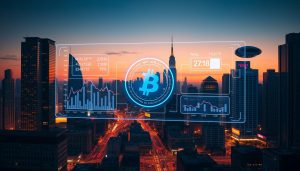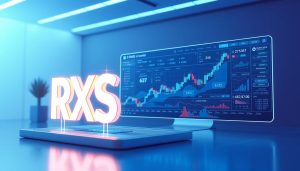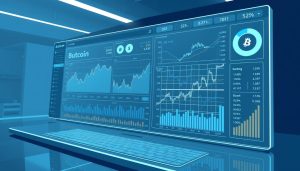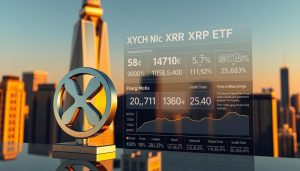Ripple XRP is making waves in digital finance. Over 300 financial institutions in 40 countries use RippleNet’s blockchain technology. This shows XRP’s potential to transform global financial transactions.
Ripple crypto is more than just another digital asset. It’s a sophisticated payment protocol designed to solve banking challenges. XRP aims to streamline cross-border transactions, offering unmatched speed and efficiency.
So, what exactly is Ripple XRP? It’s a digital payment technology for fast, secure international money transfers. The platform combines traditional banking with blockchain innovation.
This creates a more accessible financial system for businesses and individuals worldwide. XRP bridges the gap between old and new financial methods.
Key Takeaways
- Ripple XRP is a blockchain-based payment protocol
- Supports near-instantaneous global financial transactions
- Significantly reduces traditional banking transfer costs
- Designed for enterprise-level financial solutions
- Backed by hundreds of financial institutions globally
Introduction to Ripple XRP
Ripple XRP is revolutionizing digital finance with innovative technology. It offers a groundbreaking approach to blockchain, challenging traditional financial systems. Ripple’s platform aims to transform how we handle and transfer money globally.
Overview of Ripple
Ripple tackles limitations in existing financial networks. It creates efficient payment systems that work globally with incredible speed. The platform offers unmatched reliability for digital transactions.
- Founded in 2012 by technology entrepreneurs
- Designed to facilitate instant international transactions
- Built on a unique distributed ledger technology
History and Development of XRP
XRP started as a vision to reshape global financial infrastructure. Unlike traditional cryptocurrencies, Ripple created a digital asset to bridge monetary systems seamlessly.
XRP was created to solve real-world payment challenges in the financial ecosystem.
Key milestones in XRP’s development include:
- 2012: Ripple Labs founded
- 2014: First major banking partnerships established
- 2017: Significant expansion of global financial networks
The XRP blockchain offers a sophisticated approach to digital transactions. It provides financial institutions with a robust solution for cross-border payments. Ripple’s technology challenges traditional banking, offering faster and more cost-effective alternatives.
How Ripple XRP Works
Ripple XRP’s mechanics showcase a groundbreaking approach to digital transactions. It blends cutting-edge technology with financial innovation. The Ripple network revolutionizes digital finance with its sophisticated design.
Understanding RippleNet and XRP Ledger
RippleNet connects financial institutions globally, serving as a payment infrastructure. The Ripple ledger is a decentralized platform for fast, secure transactions. It enables real-time processing and provides a robust digital framework.
- Global financial connectivity
- Real-time transaction processing
- Secure digital infrastructure
The Role of Consensus Protocol
Ripple XRP’s unique consensus protocol is its core feature. Unlike traditional blockchain systems, it offers faster and more energy-efficient validation. This protocol ensures both speed and security in transaction processing.
| Protocol Feature | Benefit |
|---|---|
| Decentralized Validation | Ensures transaction security |
| Rapid Confirmation | Processes transactions in seconds |
| Low Energy Consumption | Environmentally friendly approach |
The consensus mechanism represents a breakthrough in digital transaction processing, offering unprecedented speed and reliability.
Financial institutions use the Ripple network to improve cross-border payments. It reduces transaction costs and boosts global financial connectivity. This innovative system is reshaping digital finance technology.
Key Features of Ripple XRP
Ripple XRP is a game-changer in the crypto world. Its tech capabilities are revolutionizing financial transactions. Three core features make XRP powerful in the global financial ecosystem.
Lightning-Fast Transaction Speeds
XRP transactions are incredibly quick, completing in just seconds. The Ripple network settles transactions in 3-5 seconds. This speed gives XRP a big edge in international money transfers.
- Average transaction time: 3-5 seconds
- Traditional bank transfers: 3-5 business days
- Global accessibility across multiple financial platforms
Minimal Transaction Costs
XRP transactions are super cheap. Banks can save big by using the Ripple network for cross-border payments.
| Payment Method | Average Transaction Cost |
|---|---|
| Traditional Bank Transfer | $25-$50 |
| XRP Transaction | $0.0002 |
Superior Network Scalability
The Ripple network can handle up to 1,500 transactions per second. This beats many other crypto platforms. It makes XRP great for big financial operations.
XRP represents a technological leap in digital financial transactions, offering speed, affordability, and reliability.
These features make XRP a game-changer in global fintech. It offers unmatched efficiency for digital transactions.
Ripple XRP vs. Traditional Banking Systems
Ripple payments are challenging the traditional banking ecosystem. XRP transactions are reshaping international money transfers. They offer a glimpse into a more efficient financial future.
Ripple XRP and traditional banking systems have stark differences. Let’s explore their efficiency and accessibility.
Transaction Time Comparison
Traditional bank transfers can take days for international payments. XRP transactions complete in seconds. This speed revolutionizes cross-border financial interactions.
| Transfer Method | Average Transaction Time | Cost |
|---|---|---|
| Traditional Bank Transfer | 3-5 Business Days | $25-$50 |
| Ripple XRP Transaction | 3-5 Seconds | $0.0001 |
Cost Analysis of Ripple Payments
XRP transactions cost a fraction of traditional banking fees. Banks charge substantial amounts for international transfers. Ripple offers a remarkably affordable alternative.
Global Reach and Accessibility
- Eliminates geographical barriers
- Instant cross-border transactions
- Minimal transaction fees
- Works across multiple financial networks
“Ripple XRP is not just a cryptocurrency; it’s a global financial ecosystem that breaks down traditional banking limitations.” – Financial Innovation Expert
Ripple’s technology offers a powerful alternative to conventional banking systems. It provides speed, affordability, and global accessibility for financial transactions.
Statistics on Ripple XRP Adoption
XRP has become a key player in digital finance. Its adoption statistics reveal its growing market presence and future potential. Let’s explore the current state of XRP in the cryptocurrency world.
Market Capitalization Insights
XRP’s price has shown strength in the volatile crypto market. It holds a competitive position among top digital assets. XRP’s market cap reflects significant investor interest.
- Current market rank among cryptocurrencies
- Total market capitalization value
- Comparative performance against other digital assets
Transaction Volume Analysis
XRP adoption is growing, with impressive transaction volumes. Financial institutions and investors recognize its efficiency for cross-border transactions.
“XRP represents a transformative approach to digital financial transactions” – Cryptocurrency Analyst
| Year | Transaction Volume | Growth Percentage |
|---|---|---|
| 2021 | $5.2 Billion | 22% |
| 2022 | $7.8 Billion | 35% |
User Growth Trajectory
XRP’s user base is expanding rapidly. It attracts individual crypto enthusiasts and major financial institutions alike. This growth shows XRP’s increasing importance in global digital finance.
- Individual investor growth
- Institutional adoption rates
- Global geographical expansion
These statistics underscore XRP’s potential as a transformative digital asset in the evolving financial ecosystem.
Predictions for Ripple XRP’s Future
The ripple crypto landscape is evolving rapidly. Exciting possibilities await XRP investors and enthusiasts. Recent market analyses show significant growth potential in the digital asset space.
Analysts are closely watching XRP price trends. Bold predictions are emerging from the financial sector. A recent analysis suggests potential price milestones that could reshape investor expectations.
Market Trends and Analysts’ Views
The current XRP landscape reveals several promising indicators:
- TradingView analysts predict potential price surges
- Financial experts project significant market growth
- Institutional interest continues to build momentum
“XRP stands at a critical junction of technological innovation and financial transformation.” – Crypto Market Analyst
Potential Use Cases
Ripple XRP is positioning itself as a versatile digital asset. Its applications are expanding in various fields.
- Cross-border payment solutions
- Micropayment platforms
- Smart contract implementations
- Financial institution integrations
Regulatory Impact and Challenges
The regulatory environment remains crucial for XRP’s future. Recent developments have sparked interest in the crypto community.
- Nine firms filing for spot XRP ETFs
- Increased SEC engagement
- Growing institutional recognition
Investors should balance caution with optimism about the ripple crypto ecosystem. XRP’s potential continues to intrigue market watchers. Projections range from modest growth to significant price appreciation.
Tools and Resources for XRP Investors
XRP cryptocurrency can be complex for new investors. This guide offers essential tools, wallets, exchanges, and resources for your Ripple journey.
You’ll discover key elements to start your XRP adventure. These tools will help you navigate the crypto world confidently.
Wallet Options for Storing XRP
Choosing a secure wallet is vital for storing XRP. Here are top wallet recommendations:
- Ledger Nano X: Hardware wallet with robust security
- Toast Wallet: User-friendly desktop and mobile option
- Exodus Wallet: Multi-cryptocurrency support
- Atomic Wallet: Decentralized wallet with intuitive interface
Top Exchanges for XRP Trading
Reliable exchanges are crucial for buying and selling XRP. Consider these platforms:
| Exchange | Trading Fees | XRP Support |
|---|---|---|
| Binance | 0.1% | Full Support |
| Coinbase Pro | 0.5% | Full Support |
| Kraken | 0.26% | Full Support |
Educational Resources for Beginners
Boost your Ripple crypto knowledge with these learning platforms:
- CoinDesk Learning Center
- Ripple’s Official Website
- YouTube Channels: Crypto Daily, DataDash
- Online Courses: Udemy Cryptocurrency Fundamentals
Remember: Always conduct thorough research and never invest more than you can afford to lose.
Frequently Asked Questions about Ripple XRP
Ripple XRP is a complex cryptocurrency. These FAQs will help you understand its key aspects. You’ll gain clarity on common questions from investors and enthusiasts.
What Makes Ripple Different from Bitcoin?
Ripple XRP has unique features compared to Bitcoin. It’s designed for financial institutions and cross-border transactions.
Ripple uses a centralized network, unlike Bitcoin’s decentralized approach. It offers faster transactions, taking only 3-5 seconds. Ripple also has lower costs and is tailored for institutional use.
- Centralized network vs. Bitcoin’s decentralized approach
- Faster transaction speeds (3-5 seconds)
- Lower transaction costs
- Designed for institutional use
Is Ripple XRP a Good Investment?
XRP has shown significant potential as an investment. Recent developments, like the SEC legal resolution, have boosted its outlook.
Before investing, consider these factors:
- Market volatility
- Technological innovations
- Regulatory landscape
- Long-term adoption potential
How is XRP Used in Cross-Border Payments?
Ripple’s revolutionary approach to international transactions sets it apart in the cryptocurrency world. XRP acts as a bridge currency for fast, low-cost cross-border payments.
Financial institutions use RippleNet to improve their services. It helps them cut costs and speed up transactions.
- Reduce transaction costs
- Eliminate intermediary banks
- Provide real-time settlement
- Increase global financial accessibility
The future of international finance might well be powered by innovative technologies like Ripple XRP.
Conclusion: The Future of Ripple XRP in Finance
Ripple payments are reshaping digital finance, challenging traditional banking systems. XRP adoption excites financial technology experts and investors worldwide. Ripple leads the way in revolutionizing cross-border transactions as blockchain technology advances.
The global financial scene is changing with innovative digital payment solutions like XRP. Institutional interest in cryptocurrency is growing rapidly. Ripple aims to streamline international money transfers efficiently.
XRP’s ability to cut costs and speed up transfers appeals to financial institutions. They seek efficient payment methods to improve their services. This makes Ripple an attractive option for many organizations.
Investors should approach XRP with caution. The cryptocurrency shows promise in transforming payments. However, market volatility remains a key factor to consider. Understanding the technology and regulations is crucial.
XRP adoption is set to grow in the future. Its unique consensus protocol offers advantages over traditional systems. The scalable network provides benefits for various financial operations.
Research, risk management, and a long-term view are essential. These factors help in exploring this innovative digital financial technology. Staying informed about XRP developments can lead to better investment decisions.















